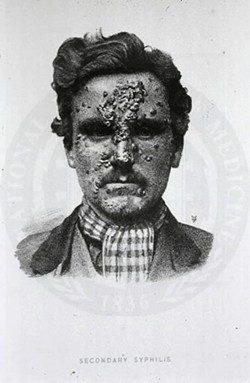Eight years ago, state public health experts set what they thought was a reasonable goal: Education and testing could eliminate an easily treatable sexually transmitted disease by 2005.
Now, that goal isn't any closer to being a reality -- at least not in Mecklenburg County. While syphilis has been all but wiped out in many North Carolina counties, syphilis rates in 2005 were higher than they were in years. And the number of new infections this year is expected to be even higher.
The number of early stage syphilis infections reported in Mecklenburg more than tripled between 2003 and 2005, from 42 cases to 142, said county epidemiologist Donna Smith. Already, the health department this year has reports of 120 new syphilis infections -- about 85 percent of last year's total.
These cases "are relatively few, but alarmingly higher than we would expect," said John Glorioso, Mecklenburg County's syphilis elimination project coordinator. "It's pretty drastic."
Syphilis, the centuries-old disease that once felled paupers and kings alike, is hardly the county's most prevalent STD. That would be Chlamydia. Nor is it deadly, like AIDS. Today, penicillin and other antibiotics have rendered the ultimate ills of syphilis -- paralysis, blindness, dementia and even death -- largely obsolete in industrialized countries.
But the rise in syphilis rates alarms public health workers, nonetheless. Though the disease is considered to be cyclical, meaning infection rates rise and fall naturally, syphilis worries health workers in large part because of its close ties to HIV, the virus that causes AIDS.
The Centers for Disease Control and Prevention estimate that having syphilis increases two- to five-fold the chance of transmitting HIV. That's because the disease's characteristic sores, called chancres, allow for easy infection, and because the same sexual behavior -- unprotected sex -- that puts one at risk for one disease also does the same for the other.
The Southeast struggles with syphilis significantly more than other regions. Some mostly rural, less populous states -- such as the Dakotas -- go a year or more without recording a single infection. Some North Carolina counties do as well, but the state overall has posted rates that have ranked it among the worst in the country.
In 2001, it had the fifth-highest syphilis rate in the nation. In 1998, the CDC identified 28 US counties as reporting more than half the nation's syphilis cases. North Carolina was the only state with five counties on the list: Mecklenburg, Forsyth, Guilford, Robeson and Wake.
That ignominy led to the development of the state's syphilis elimination project, said Jan Scott, coordinator of the state's efforts. When public health experts in 1998 forecasted the end of syphilis in North Carolina, the goal seemed realistic, said Scott.
The outlook -- that education and testing could reduce infection rates from one of the highest in the nation to fewer than one infection per 100,000 people -- was optimistic, but not wildly out of reach, said Scott, also a public health advisor for the CDC.
Four years after the project was launched in 1998, the syphilis rate plummeted from 11.7 infections per 100,000 people to 2.2 per 100,000 in 2002. Jail screenings and public health outreach in high-risk neighborhoods combated infections among at-risk populations -- namely, people involved in prostitution and drugs.
"Things were coming under control. It was really seen as successful," said Scott.
But then private doctors began reporting syphilis cases in middle-aged men who had sex with men. These men typically had enough money and insurance to see private doctors. And they typically lived in Mecklenburg County.
The chance of eliminating syphilis by 2005 had vanished.
"We did actually come close, until this outbreak in Charlotte," Scott said.
Higher-than-average syphilis rates hadn't been associated with gay men previously. But now Charlotte was seeing a trend found in major cities like San Francisco, Los Angeles and New York. Now, about a third of syphilis infections reported in Mecklenburg are among men who have sex with men, Glorioso said.
Donna Smith, a health department epidemiologist, said syphilis also seems to be disproportionately affecting two other overlapping groups: college-age men and middle-aged men, who may or may not be gay. But numbers are climbing for women as well. More African-Americans and Hispanics are testing positive for the disease, too. "We've seen increases across the board," Smith said.
Why the rise in syphilis at this point? Some studies indicate that worry about contracting HIV has declined, leading to less concern about unprotected sex. "(Some) people, especially the young who didn't experience the death and the fairly horrific scenarios that played themselves out in the '80s and the '90s before the advent of protease inhibitors, think, 'I don't want to get it, but if I do, they have drugs for that now,'" Glorioso said.
He also suspects increased use of club drugs, such as ecstasy and crystal methamphetamine, as another factor that can lower inhibitions and render people more likely to engage in risky sexual behavior.
Scott, the state syphilis elimination coordinator, suspects the Internet might have a role in higher syphilis rates. Many Web sites allow people to easily seek anonymous sexual partners. And afterward, the one-night companions may not be found so easily.
"People hook up on the Internet in such an anonymous fashion that the only way they can tell their partners [later about an infection] is to send an e-mail."
With that in mind, state health officials are talking with a private company about how the state might use e-mail to notify people they may have been infected. North Carolina health agencies already help people anonymously notify potentially infected partners. An e-mail program, similar to one already in use in California, could help when only e-mail addresses are known.
State and local health officials had amended their plans and now hope to eliminate syphilis by 2010.
"We've got to get on top of this right now," Scott said.
For information on testing, call 704-432-TEST between 8am and 10pm.
Speaking of 4.80000
-

Best of The Blotter 2007
Nov 28, 2007 -
Living La Vida Loophole
Aug 22, 2007 -
Justice for the Jena Six
Jul 25, 2007 - More »
Latest in News Feature
More by Karen Shugart
-
Mecklenburg and beyond ...
Feb 10, 2009 -
Mecklenburg and beyond ...
Feb 9, 2009 -
Mecklenburg and beyond ...
Feb 6, 2009 - More »
Calendar
-

Wine & Paint @ Blackfinn Ameripub- Ballantyne
-

Face to Face Foundation Gala @ The Revelry North End
-
An Evening With Phil Rosenthal Of "Somebody Feed Phil" @ Knight Theater
-
Kountry Wayne: The King Of Hearts Tour @ Ovens Auditorium
-

Queen Charlotte Fair @ Route 29 Pavilion
-
Esports in Charlotte Takes Off: A Guide to Virtual Competitions and Betting
-
Canuck in the Queen City 7
A Canadian transplant looks back at her first year as a Charlotte resident
-
Lewis family launches Twelve In Twelve 1
The nonprofit hopes to raise money for 12 organizations around the world and encourage 'voluntourism'












